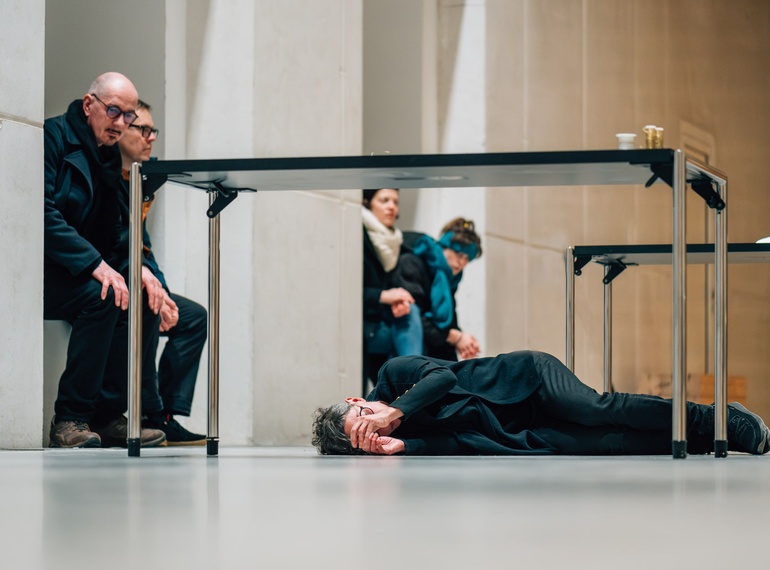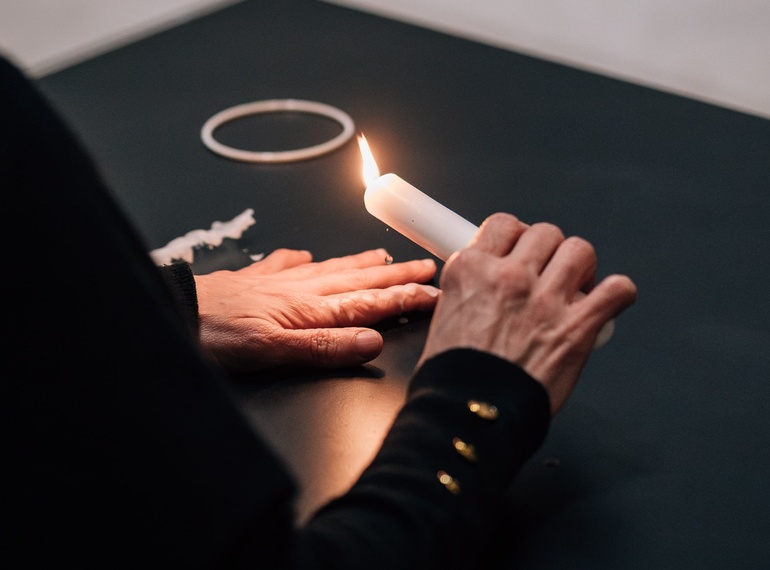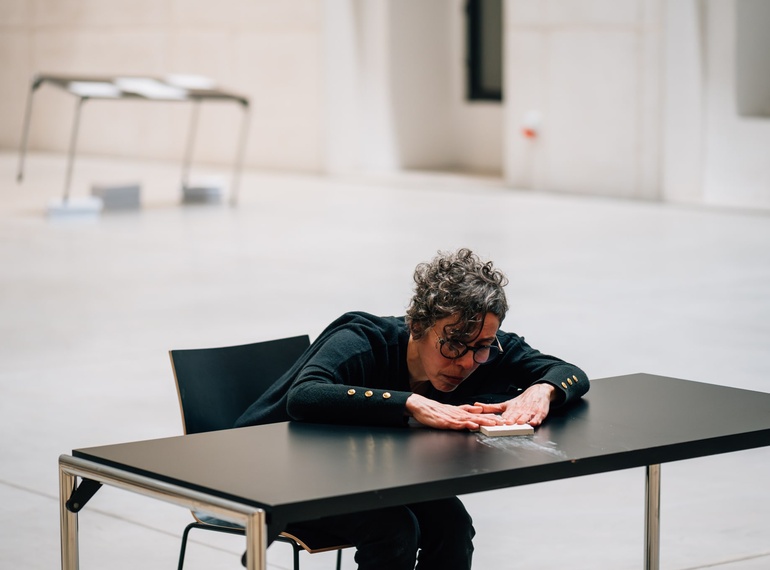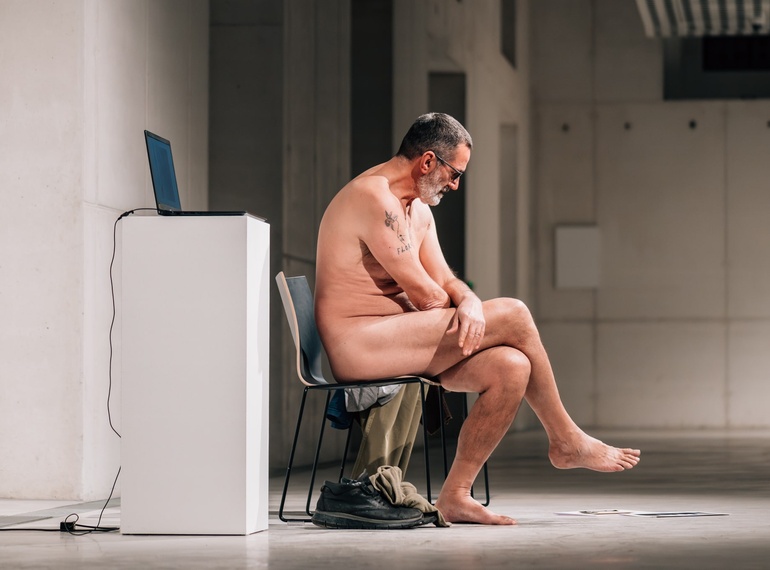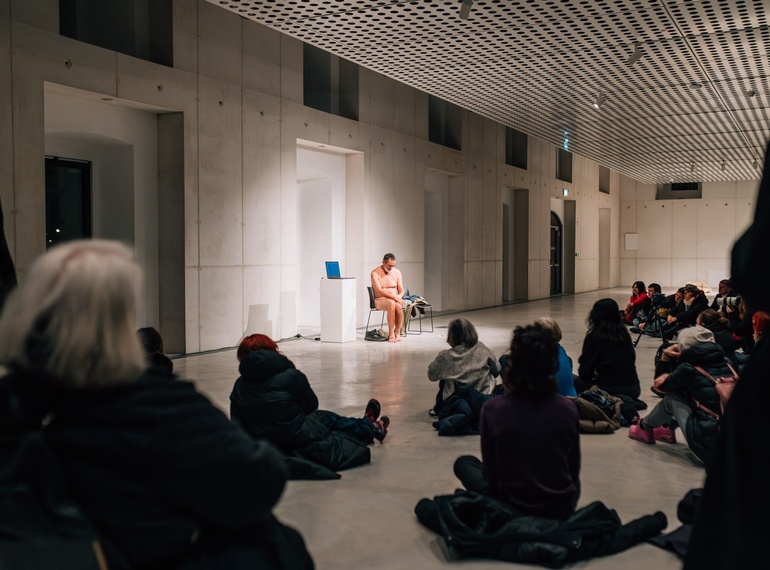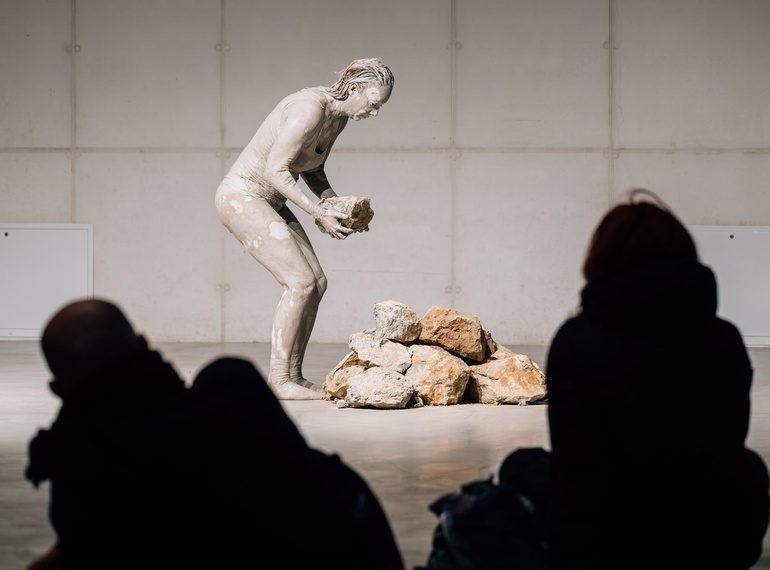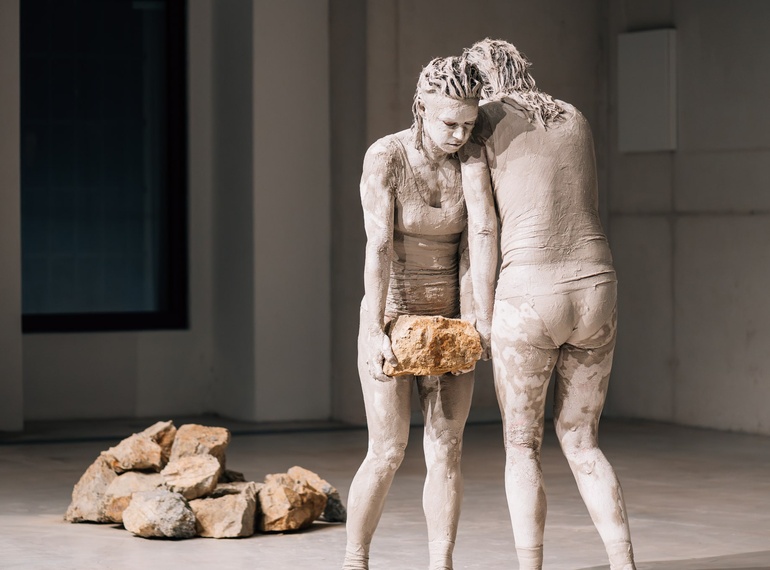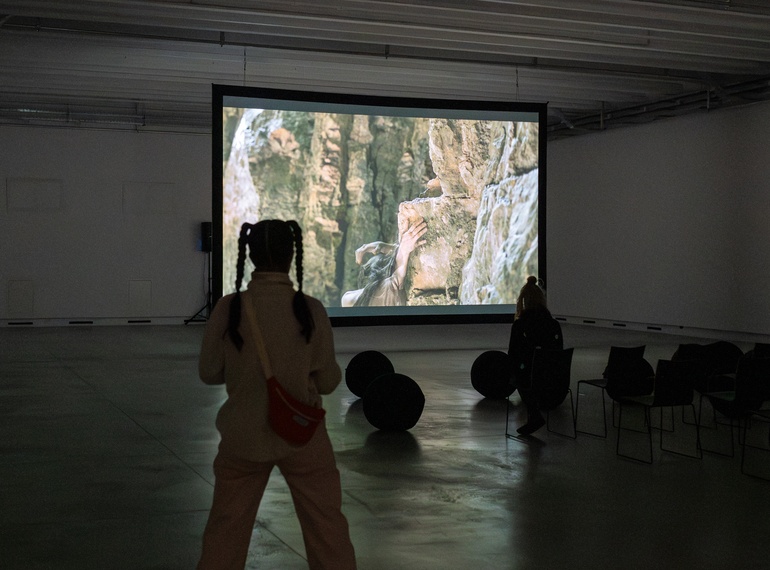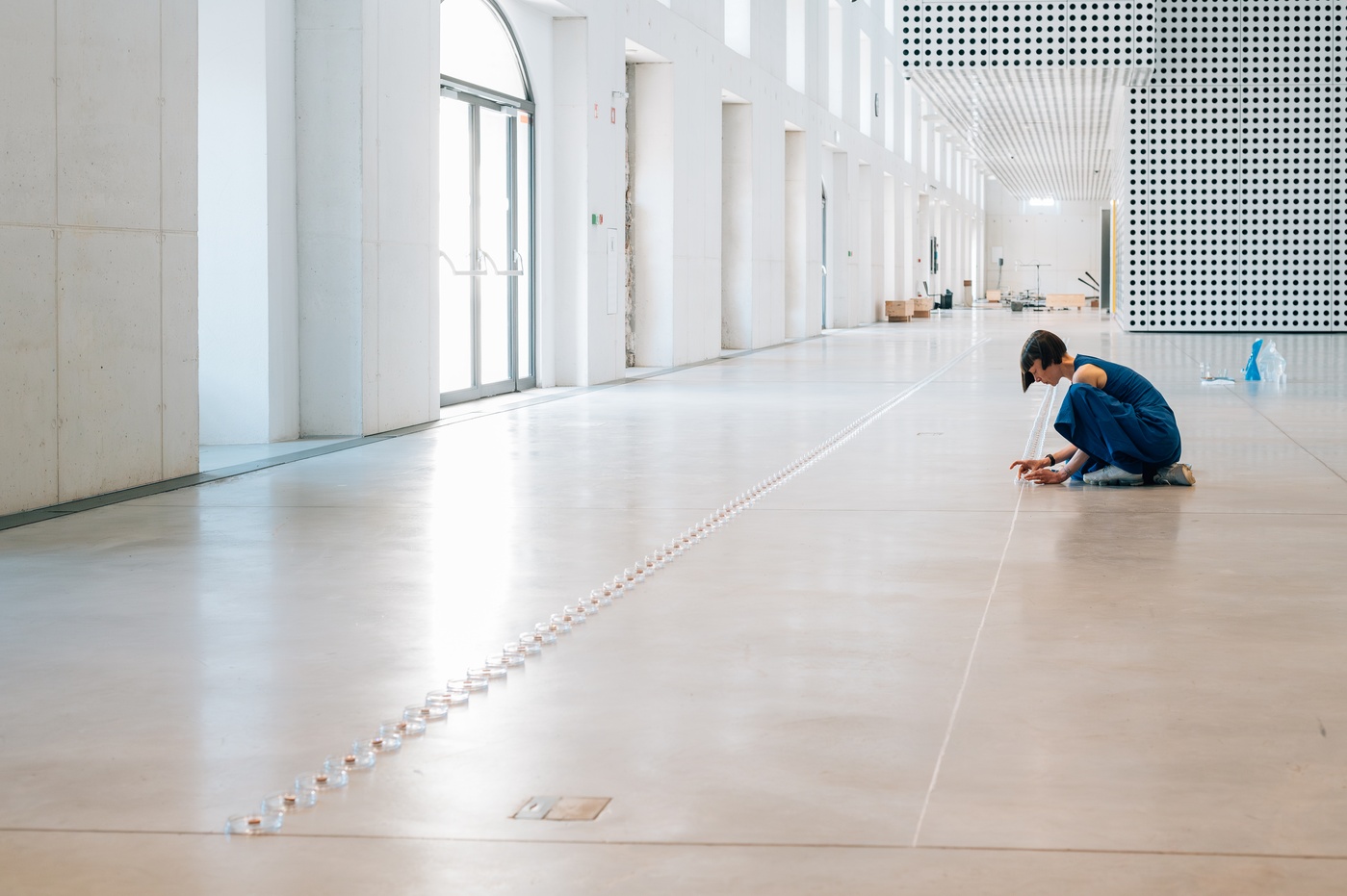Performativa
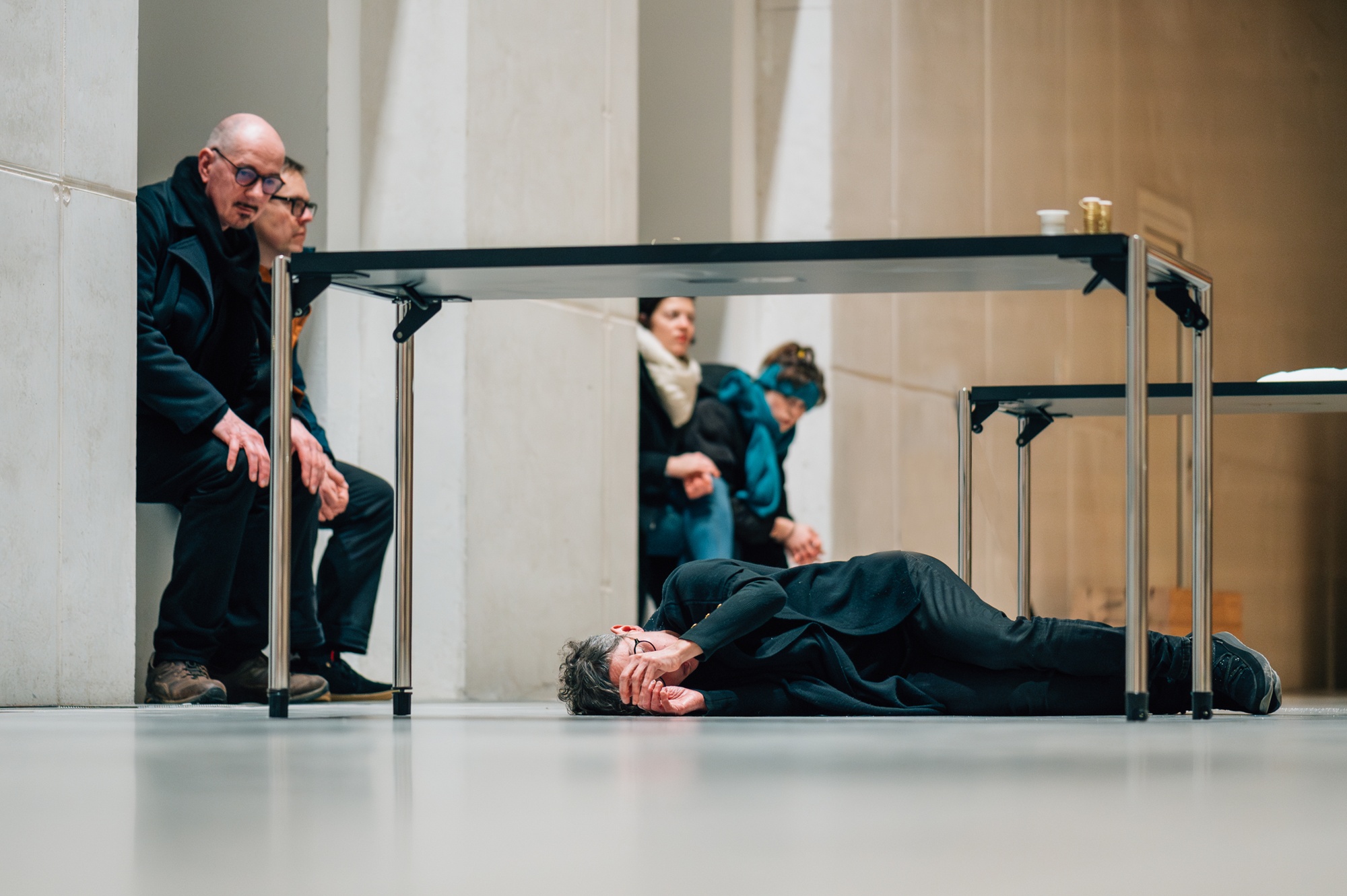
The first edition of PERFORMATIVA presents works that are characterised by an incision into time; whether it is an incision into one’s own memory, history, geological time or the present.
In 2024, we are launching a new programme cycle PERFORMATIVA at Cukrarna, which will be dedicated to performance and other related performative practices. PERFORMATIVA has the objective of continuously presenting national and international contemporary artistic production of performance – of creativity in a vibrant and extremely heterogeneous field, characterised by an evasion of established definitions and formats, a preference for experimentation, hybridity in terms of genre, and the constant creation of conditions within which the unpredictable can happen.
The programme is structured in three periods: at the end of January, in May and November, each edition will include works by national and international artists. The programme addresses the categories of temporality, spatiality and corporeality as fundamental features of performance and performative practices that carve into the contemporary socio-political fabric, but each of its strands will be focused on one of the basic categories. Thus, the January strand is marked by works that in various ways engage with the notion of TIME, the May strand is devoted to the notion of SPACE, and the November strand to the BODY, questions of presence and corporeality.
The first part of PERFORMATIVA, on the 25th of January 2024, includes four works by an international line-up of artists who will populate different spaces of Cukrarna (basement, lobby and Parter Gallery). The cycle includes two performances, a three-hour action and a gallery preview of a film of performances executed for the camera. The first edition of PERFORMATIVA was created as a collaboration between Cukrarna and Glej Theatre, since it is also part of the programme of the new international festival of performance Infinite Present, which was created as part of the Time for Live Art project. The title of the festival suggests that it will encourage reflection on the notion of corporeality in the intense duration of the present moment, which overrides the past kind of continuity, on the time of history, a linear, continuous time that encompasses the past, the present and the future. The festival will take place at Glej Theatre and Cukrarna between the 24th and 26th of January 2024.
The works presented are characterised by an incision into time; whether it is an incision into one’s own memory, history, geological time or the present. At the same time, these works consciously resist the accelerated chrononormativity of contemporary society, the so-called schizophrenic temporality and hyperproductivity. On the contrary, artists use different artistic strategies to deal with spatio-temporal relations: repetitiveness, endurance, persistence, slowing down, ultimate presence in the cyclical process of dwindling, whether it is to deal with associative memories of the personal microcosm, related to the question of human existence, transience and death, or with universal themes, looking into the deep layers of human civilisation, which always also address the core existential and social questions. Each individual work can be observed as a process within which a fragile map of transient situations emerges, mediated through experiences, gestures, isolated and translated by the body in a given moment.
The programme will start at 10 a.m. at the basement of Cukrarna, where Strata, a film by the artistic tandem VestAndPage, will be presented for the first time as a gallery preview. The film will have its world première in February 2024 in the Netherlands. The project can be described as a hybrid between film and performance, because it is based on interdisciplinary performances by nineteen international artists (Aldo Aliprandi, Marianna Andrigo, Andreas Bauer Kanabas, Anguezomo Mba Bikoro, Giorgia De Santi, Francesca Fini, Nicola Fornoni, La Saúla/La Pocha Nostra, Stephan Knies, Fenia Kotsopoulou, Boris Nieslony, Ralf Peters, Enok Ripley, Sara Simeoni, Marcel Sparmann, VestAndPage, Susanne Weins, PYUR, Woob), who in 2021 went to the prehistoric caves of the Swabian Jura and created a set of poetic and philosophical contributions for the camera about the exploration of the experience of deep geological time, millions of years, inside the body.
Martine Viale will start her multi-hour action Untitled (Wanderings) at the lobby of Cukrarna at 6 p.m. The artist creates her works as site-specific actions that are deeply rooted in a practice of spatio-temporal presence. In the process of time passing, she develops ephemeral and subtle situations, enacts and records her presence by creating ephemeral maps made up of traces of micro-actions performed. In the ever-eluding present, the present moment, which comes from the future and recedes into the past as it passes us by, repeatedly searches for and accumulates traces of meaning, opening up space for possible dialogues between its own body and the spectator’s body, between time and place of performance.
At 7 p.m., Tajči Čekada and Ivana Kalc will present Worksite 101/3, the third performance created on the specific site of the former political prison Goli Otok, in the so-called Peter’s Hole, a worksite for psychological and physical torture of detainees. In a repetitive and slow-motion choreography, the artists perform absurd and endless work: carrying stones from pile to pile, raising the issue of the economy of labour in our times. By placing the performance within the site of Cukrarna Gallery, its context is expanded to the specific issue of work in the field of art, especially its (in)visibility and valuation.
To close the event, at 9 p.m. we will present a new performance by Slaven Tolj with the chronotopic title Ljubljana, the 25th of January 2024. The artist, known for his minimalist and radical artistic practice, brings in a complex personal poetics that is closely linked to his health problems of the last few years, which have resulted in impaired verbal communication and speech articulation disorders. His methodology could be described as an “archaeological” approach, as he incorporates selected photographs and objects from his own archive, which he treats in a fragmentary and associative way. It appears he uses past experiences to stimulate neural connections and networks within the damaged brain, strengthening memory and creating an abstract space of past events and states to navigate the present and control reality. The title of the work is a confession about Tolj’s today, a place of constant confrontation with death, but also a testament of transience.
The programme is designed to take place simultaneously in several spaces of the gallery. Visitors are invited to create their own itinerary, immerse themselves in subtle artistic interventions in time and space and experience them at their own pace. The current spatio-temporal installation, populated with performances and actions, seeks to create an open situation for the formation of different temporalities, different dynamics of coexistence and presence, as well as a space for reflection on the transformation of temporal concepts that emerge at the intersection of bodily and social temporalities and real time.
Curated by Mara Anjoli Vujić
Photos: Andrea Knežević, Milomir Kovačević, Max Wyse, Fenia Kostopoulou; Producers: Janja Buzečan, Nastja Miheljak, Inga Remeta; Technical production: Martin Lovšin; Production: Glej Theatre; Coproduction: Cukrarna Gallery MGML; With the support of: City of Ljubljana, Ministry of Culture, Creative Europe Programme of the European Union; The programme is part of the European project Time for Live Art.
Opening hours
Tuesday to Sunday: 10.00–19.00
Tickets
Free entry.
Press kit
VestAndPage: STRATA (2024)
film, gallery preview, 75 min (English with subtitles in English)
“STRATA” is the fifth hybrid of performance art and film by artist duo VestAndPage. It is a film of philosophical, poetic action shot in 2021, to be released in 2024. STRATA explores caves as proto-spaces for altered states and sites of knowledge-making and human becoming. It takes place in prehistoric Swabian Jura caves used by Ice Age humans for shelter about 33,000 to 43,000 years ago. At these finding sites of the oldest known examples of human figurative artworks, VestAndPage convene in an interdisciplinary gathering of contemporary artists and scientists to challenge central existential and social issues. The caves are the symbiotic realms to dance between embodiment and scrutiny, the unseen and the unforeseen, the oppressed and unspoken, the forgotten and the repressed.
Coming together to look into the river of human civilization and to share what they had found, the artists irradiate concepts of time, ecological intelligence, and politics through performances for the camera. The film pinholes a perspective on a world where art, science and multiple voices and perspectives nourish each other in co-creative processes. Nestled inside the dark subsurfaces of the land, the artists confront romantically distorted images of nature and naturalness to dismantle consolidated narratives and aesthetics. The human body and stratified societies are tied in continuity to the geological, beheld through a lens of queer ecology.
Since 2006, German artist Verena Stenke and Venetian-born artist and writer Andrea Pagnes have been working together as VestAndPage internationally in performance art, performance-based film, writing, publishing, and temporary artistic community projects.
Since 2010, they have been devoted to experimental performance-based filmmaking, producing four feature-length films, a silent film, a trilogy of shorts, and numerous other shorts, art videos and interview series. In 2020, they published their manifesto on performance-based filmmaking: “Poetics of Relations.”
They are the founders and directors of the Venice International Performance Art Week, and their poetic writings and research articles have been extensively published and translated for international readers. They share their methodology on performance-based filmmaking and collaborative performance and in masterclasses at art academies worldwide.
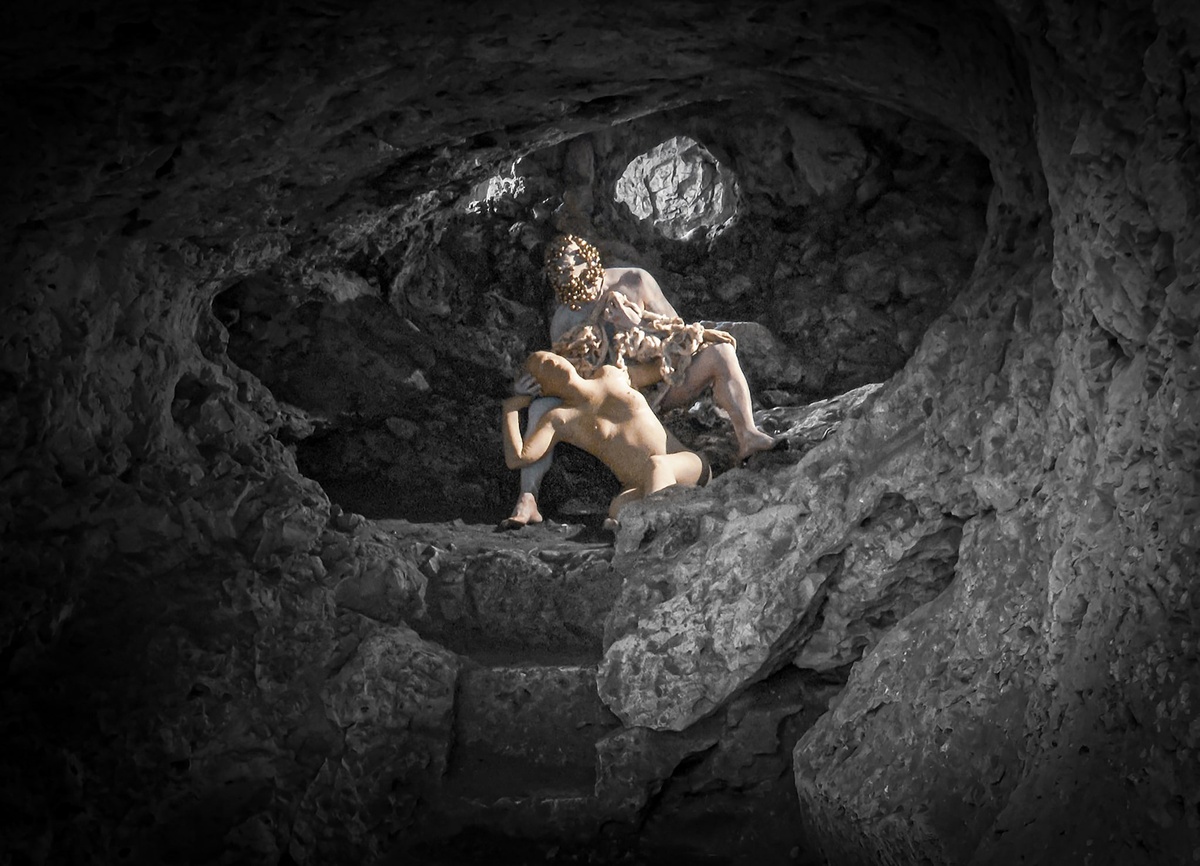
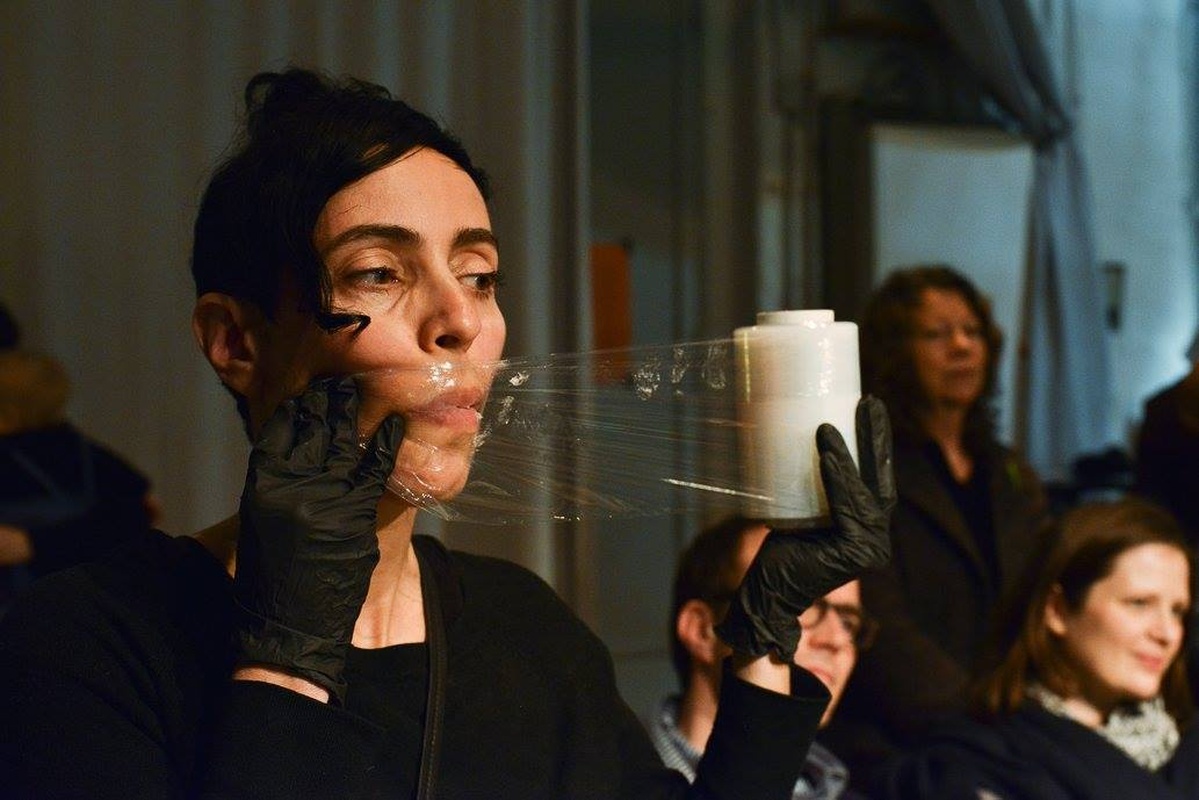
Martine Viale: Untitled (Wanderings)
action, 180 min
"Connecting presence, memory, history, cohabitation, meaning, silence, and a certain sense of NOW, the work is about a circular process which will gradually create a sensitive map through the development of variable and ephemeral situations. The idea of re-search, of searching again in a NOW constantly renewed.
Re-searching and accumulating traces of meaning as I go, I will be using my body as a scale to blur the line between the performance space and the non-performance space to open possible dialogues between my body, the body of the viewer, time and the actual architecture of the place; it is about action-conversation; it is about a trajectory in-between; it is about an interconnected space."
Martine Viale is an action art artist. Her work, contextual and site-specific is anchored in a practice of presence. Working regularly in public space and unusual locations that can facilitate unpredictable encounters with passers-by, she seeks to create an open space in which daily interactions have the potential to become part of artistic strategies. Trying to underline the artistic possibilities hidden in the ordinary, she develops ephemeral and subtle situations that reflect on interval spaces.
Everything related to territory, borders and displaced spaces is of particular interest to her. Born in Montreal, Canada, Martine Viale lives and works in Perpignan, France. Since 1999, her work has been presented in several festivals, galleries and site-specific contexts across Canada and internationally, notably in Brazil, Israel, Poland, Cyprus, the United States, Brittany, France, Belgium, Serbia, the Philippines, Japan, Scotland, Spain, Ukraine and Denmark.
Ivana Kalc & Tajči Čekada: WORKSITE 101/3 (Radilište 101/3)
performance, 45 min
The artistic series of performances called “Worksites” always focuses on the critique of the economy of labor or questions the meaning of work within a particular context that proves to be relevant in a given space or time. The specificity of each performance is the demonstration of an action that contradicts itself and can last forever, remaining trapped in some kind of status quo, thus emphasizing the absurdity of certain aspects of human behavior. Each “Worksite” is symbolically numbered, derived from the context of the theme being addressed. In the context of choreography and performance style, each “Worksite” is based on a precisely established protocol of movement of certain work sequences that are put into a repetitive mode of movement and repeated.
In 2019, the artists performed Worksite 101 on Goli otok (Bare island), which bears the name of the most infamous part of the political prison on an island Goli otok, also known as Petrova rupa(Peter`s hole). The artists transformed the sequence into the work of prisoners by carrying heavy stones from one pile to another and then back again to the same pile. The one-hour performance refers to the senselessness of repetitive actions that were used as a means of psychological torture, destabilization, and maximum exhaustion of prisoners. In addition to the slow pace of work, the artists covered themselves in clay from the location, further blending into the landscape of Goli otok and becoming invisible.
Ivana Kalc, born in Rijeka, Croatia, is a freelance dance artist. After her formal education in Rijeka (studies: German language and literature; History), she continues with contemporary dance studies in Austria (SEAD - Salzburg, Anton Bruckner Private University - Linz). After her Bachelor of Arts degree, she received the DanceWEB scholarship in Vienna (ImpulsTanz Festival 2008) and lived and worked in Germany and Austria as a dancer and dance teacher. In 2009 she founded the artistic organisation Kabinet, through which she produced her own work ("Markacije," "Siblings Kalc/Where does it all lead?," "We're in this together," “Naša stvar,” “Dancing moms”). After 2010, she returned to Rijeka, Croatia and worked with many Croatian and international artists in the field of contemporary dance theatre and performed at many festivals at home and abroad.
Born in Rijeka, Tajči Čekada distinguishes herself as an interdisciplinary artist operating within interventions in the social and media environment, performance, video, photography, and costume design. Over the course of twenty years in her artistic career, she has accomplished 37 solo and 70 group exhibitions. Through continuous experimentation with various media, she has crafted a distinctive expression imbued with a specific kind of humor. Her performances and actions are often realized outside gallery spaces, predominantly aiming to provoke social norms, religious conventions, and ethical standards. The primary focus of her research encompasses ecology, feminism, xenophobia, nationalism, religious ideologies, and sustainable economics. Her work seldom exhibits a repetitive character, and in recent years, she increasingly dedicates herself to interventions in public spaces, particularly through the manipulation of the media environment.
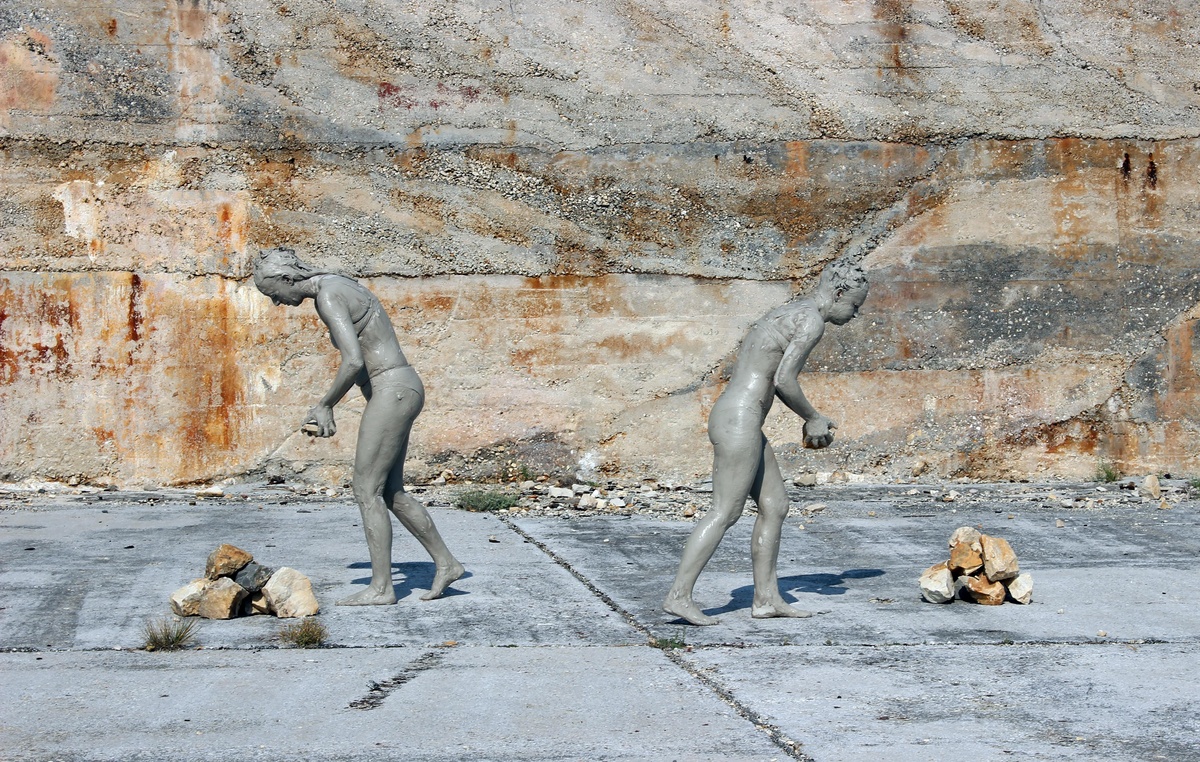
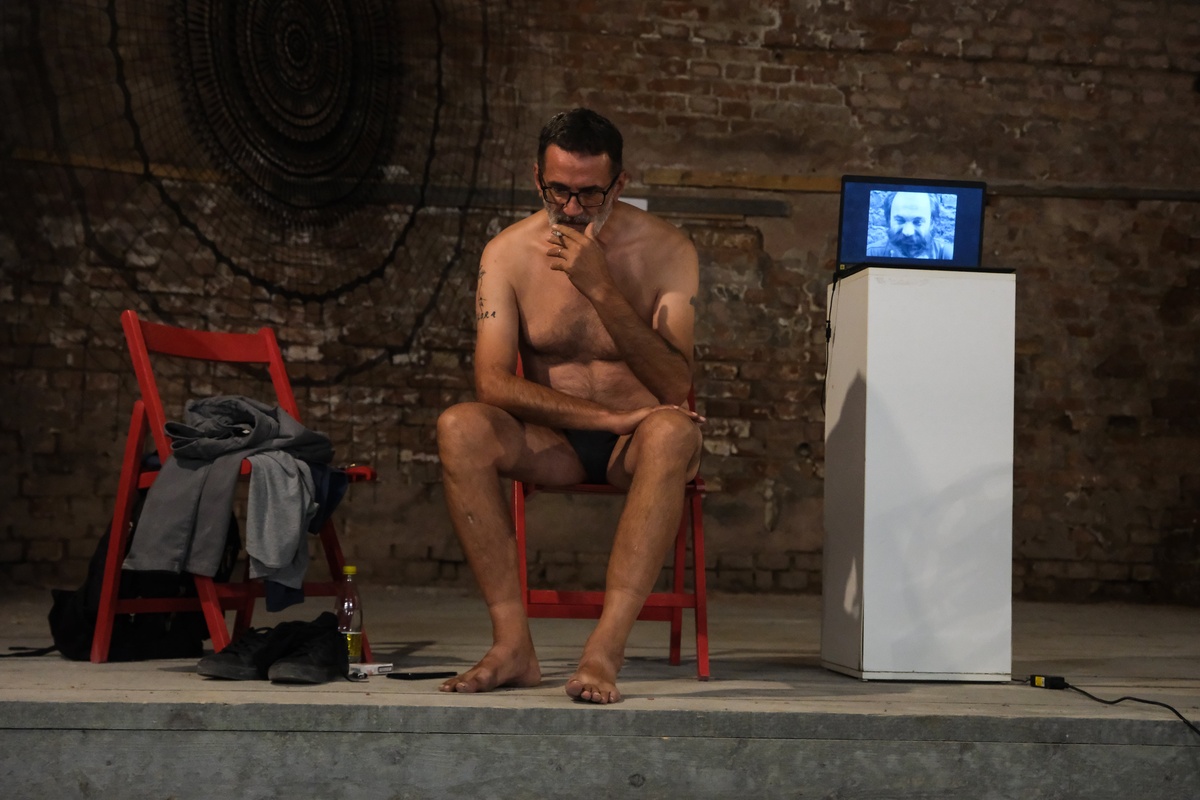
Slaven Tolj: Ljubljana, 25. 1. 2024
performance, 30 min
After facing severe health problems that impaired his verbal fluency, made it difficult to recall people’s names and certain notions, and were compounded by disorders in the articulation of speech, Slaven Tolj has, in a sense, brought his personal and complex poetics to the underworld. Regardless of the people in his mind, the things he revives with archaeological methods, or life’s circumstances and situations, we will mainly perceive death, exhaustion, decay in them – everything that is brought to completion, in some lasting associative connection with his everyday life. The deceased, irrespective of whether they were once good friends or mere acquaintances, become part of the ordinary repertoire of communication.
One of them is Pavo Urban, a young photographer who died on 6 December 1991 while capturing the war devastation of Dubrovnik. There he lay, huddled on the smoothed pavement, after capturing his own death with his camera while documenting the death of the city. Slaven Tolj will mark the occasion by selecting two of Urban’s photographs from their extensive shared archive. These are two photographs that Urban used to document Tolj’s 1988 performance. These photographs were certainly not chosen blindly. When Tolj exhibits his earlier works or segments of earlier works nowadays, he treats them not with a retrospective, but with an associative approach. They are chosen with caution because they are directly related to certain situations, phenomena, ideas and predictions that the artist is presently either obsessed with or is living. The artist will defer the passage of time in his own unique way, thus paraphrasing the verses of the poet Ingeborg Bachmann: Embrace the time and shove it into this today. Tolj’s today is a site of constant confrontation with death. Although in his work he has often walked on the fringes of life, now he no longer challenges death, but rather lives with it. Thus, while charting the melancholy of evasion, disappearance and death, Slaven Tolj will address difficult and serious universal themes through a structured microcosm of his own bodily limitations and a constant intuitive insight into the actual character of things. (Excerpt from Helena Puhara’s text)
Slaven Tolj is a Croatian conceptual, performance, and media artist, curator, and cultural worker from Dubrovnik, Croatia. His radical and minimalist practice, which encompasses performances, photographs, and ready-made situations and objects, often deals with specific social facts and historical events. At his beginnings, in the nineties, his work focused on the situation of his own country, i.e. the disintegration of Yugoslavia and especially the siege of Dubrovnik, his hometown. Then, in the post-totalitarian context, he envisaged a broader scope of investigation and engaged in issues relating to globalization and multiculturalism. In addition to his practice, Slaven Tolj has always pursued curatorial activities, starting with the foundation of Art Workshop Lazareti in Dubrovnik in 1988, currently one of the most active art centers in Croatia, which focuses on the interaction between contemporary arts and social change.
